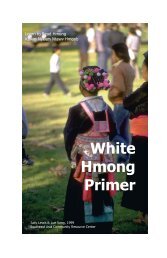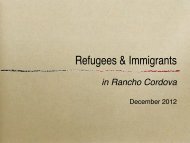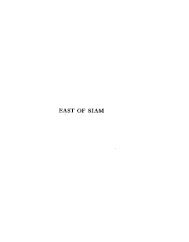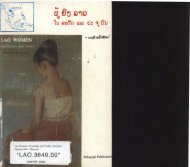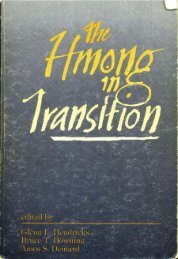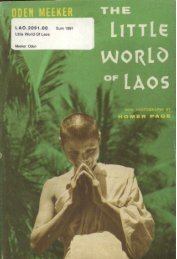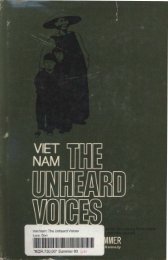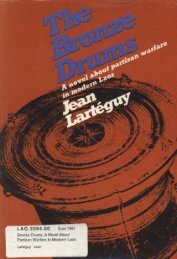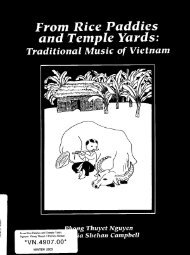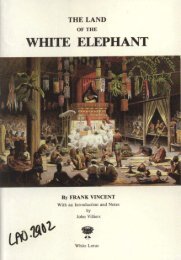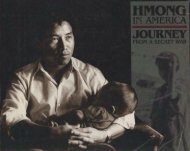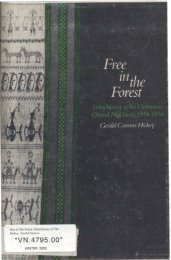PEOPLE
Grant, The Boat People - Refugee Educators' Network
Grant, The Boat People - Refugee Educators' Network
- No tags were found...
You also want an ePaper? Increase the reach of your titles
YUMPU automatically turns print PDFs into web optimized ePapers that Google loves.
The Boat People<br />
Chinese and their families in China, as well as family reunions, wen<br />
to be encouraged.<br />
Liao's article may have k n mimed mainly at a domestic audience<br />
and was probably intended to reassure thosc: Chinese with relatives<br />
overws that the discrimination thcy had suffered during the cultural<br />
revoiution and at the hands of the 'Gang of Four' had ended.<br />
It may alm have been designed to encourage skilled Chinese abroad<br />
to come home to srsiat with the progmm of modernization and econornic<br />
growth. However, if its intention was also to reassure the<br />
eounwies of South-East Asia about Peking's policy on the sensitive<br />
imes of dual nationality snd allegiance, it had precisely the opposite<br />
effect in Indonesi~, Malaysia and Singepore. Singapore authorities<br />
thought Liao's phrasing sounded like 'communist liberation' jargon.<br />
One key pssagc worried them:<br />
Most of the OYCMPB<br />
Chineae src working people, who arc the masacs fming<br />
the bast of the paaiotic united front nmong overseas Chinese a d m a force<br />
we should rely on . . . the majority of tbc bourgeois clasa arc paeriotk. Thcy<br />
hve also made contributions to the economic and cultural development in<br />
he countries where thcy live and arc pn of the motive force fur combating<br />
impcrhlism, hcgcmoni~m nnd colonialism and winning national and =on-<br />
ornic independence in the* countiits . . . we should work energetiully<br />
among them and strive to form the brosderjt patriotic united front among the<br />
wemas Chinese.<br />
Four months later, in April 1978, China made a stand against<br />
Vitmam by *king to protect the rights of tens of thousands of ethnic<br />
Chinese it was claimed were being persecuted and driven into<br />
southern China by Vietnamese authoritics. Vietnam's recent<br />
'socialization' measures had especially affected ethnic Chinese with<br />
private+nterprise interests and Liao's statement was to prove an<br />
embarrassment whm Hanoi parried with the charge drar China was<br />
'throwing a life-btlt to Vianamcsc capitalists of Chinese stock',<br />
Then, in early June 1978, Hanoi twisted the blade: 'If those Hoa<br />
capitalists lived in China, they would surely have to go through a<br />
similar mnsformation'. The point was valid. Peking had not protested<br />
at the 'mialist u~nsformation' of North Vietnam in the<br />
1950s; neither, more recently, had Chi- done anything to defend<br />
ethnic Chinese from the excesses of the Khmer Rouge rCgime, its<br />
ally in Kampuchea.<br />
Stability<br />
Later in the year, Indonesia's foreign minister, Dr Mochtar, made<br />
the point that the 'big question mark' about Peking's contentious<br />
policy was that overseas Chinest, while told to remain law-abiding<br />
residents of their host country, were expected also to maintain social<br />
and economic links with China - links that Liao had referred to as<br />
those between 'kinsmen'. Dr Mochtar said Indonesia - with four<br />
million ethnic Chintse, one million of whom were theoretically<br />
Chinese citizens and 800 000 st~teless - wanted to set how Peking<br />
applied its professed policy on overseas Chintse. He added, referring<br />
to the flight of ethnic Chinese from Vietnam: 'When developments<br />
occurred in Vietnam we wtre of course intercstcd, buse<br />
that was the proof of the very question which we were so curious<br />
about, And to say the least, what happened in Vietnim with regard<br />
to the overseas Chinese did not reassure us!<br />
Whm ASBAN foreign ministers held their regular annuml meeting<br />
fur 1979 on the Indonesimn island of Bali, their mood was sombre.<br />
Late on 30 June, thcy issued a joint communiqud which dealt again<br />
with the two related issues that dominated the gathering: the Indo-<br />
Chinese refugee crisis and the armed conflicts ecntred on Indo-<br />
China. This time they put Vicmam in the dock. There wtre a number<br />
of reasons for the hardening of ASBAN'S position. Tht five<br />
memk governments were still divided in their diagnosts of the root<br />
causes of the outflow from Viemam (whether it was due to policies<br />
of the Vietnamese, Chineac or American governments, or a combination<br />
of factors), But they had becomc convinced that Vietnamese<br />
authorities had the power to control the rate of exodus, and could<br />
only be prevailtd upon to do M, through pressure from international<br />
opinion. As they knew from the attitude of thc US, British and Australian<br />
governments, international action was now possible,<br />
Singapore, as before, led the attack, In a dramatic speech to the<br />
opening session, Foreign Minister Rajaratnam proposed that the<br />
five MEAN governments should aide with anti-Vietnemese foms in<br />
Kampuchea, (He later told the press he believed ASEAN and friendly<br />
non-communist governments should provide arms and material sup-<br />
port to the resistance movement in K~mpuchea, just as the Soviet<br />
Union was giving aid to Vietnam.) In his speech, he branded Victnam<br />
as an expansionist power with ambitions to dominate the whole<br />
of South-East Asia. He claimed that Hanoi was deliberately expel-




